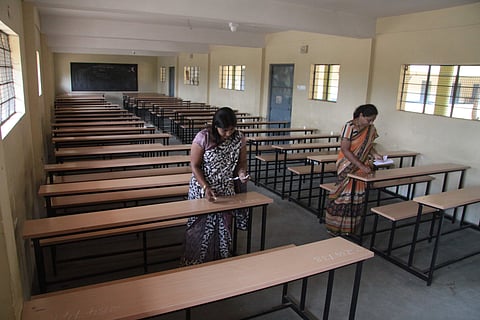

CHENNAI: The Tamil Nadu government on Friday announced the introduction of board exams for Class 5 and 8 students, from this academic year onwards.
The proposal for board exams in these classes was made in the recently released draft National Education Policy of the Central government. Even as there were much public opposition to the proposal and the draft policy is not yet finalised, the state government has announced the decision.
A source from the School Education Department told Express, that no student will be detained up to Class 8 for the next three years (until 2021-22).
However, students who fail in these exams will be detained in the same class after 2022. This decision will break the no-detention policy until class 8, which Tamil Nadu government has repeatedly advocated in the past.
While stakeholders from private schools have welcomed the decision, activists and educationalists from the government sector say that it will be detrimental for the majority of students. The board exams will be conducted from the academic year 2019-20, according to an order issued by the School Education Department on Friday.
This decision follows the Centre's amendment of the Right to Education Act earlier this year, which scrapped the no-detention policy.
Even as the amended Act gives right to the state governments to choose to not hold back students in any class until the completion of elementary education, Tamil Nadu government has decided to implement the amendment.
"Both School Education Minister Sengottaiyan and former School Education Minister Ma Foi K Pandiarajan, assured that Tamil Nadu will uphold the no-detention policy," said PB Prince Gajendra Babu, general secretary, State Platform for Common School System and an education activist.
He added that Tamil Nadu has taken a major step in retrograde after being a pioneer in several progressive education policies including free education for all and introducing nutritious meals programme.
A senior teacher from a government school told Express that the decision has been taken keeping city-based students in mind neglecting the majority living in the rural.
"Parents who send their children to government schools are largely daily wage-workers who do not have enough literacy or knowledge to assist their wards with learning. Even today many schools in the state are single-teachers schools. This decision will definitely force many students to drop out," he said.
However, no school is allowed to expel any student from the education system until the completion of elementary education, the order said. D Vasanthidevi, an educationalist and the former vice-chancellor of Manonmaniam Sundaranar University charged that "rote-learning will be the only way of education in schools," if board exams are introduced at the elementary level.
"Learning will come to a standstill if you put it out for public assessment when children are still in their formative years," she said.
The 2019 amendment to the RTE Act, however, guarantees that students who fail the examination must be given a chance to write supplementary exams within two months of the announcements of the results.
The orders said that the government may allow schools to hold back a child in the fifth or eighth classes or in both classes, if the child fails the supplementary exam also.
Countering this argument, the correspondent of a popular matriculation school in Chennai told Express that many elementary school students do not master the age-appropriate knowledge dictated by the state syllabus and keep passing over from one class to another.
Therefore scrapping the no-detention policy will improve the learning outcome, she opined. "I have seen many class V students who do not know to do basic addition or subtraction. This move will help them be on top of the syllabus," the corresponded said.
While the amendment was implemented at the Centre in March this year, the State government has instructed the Department of Elementary Education (DEE) to make appropriate arrangements to conduct the board exam.
The DEE will, therefore, be in charge of setting up an examination committee, print hall tickets, set question paper, conducting the exam, releasing the results and issuing mark statement and certificates, the order observed.